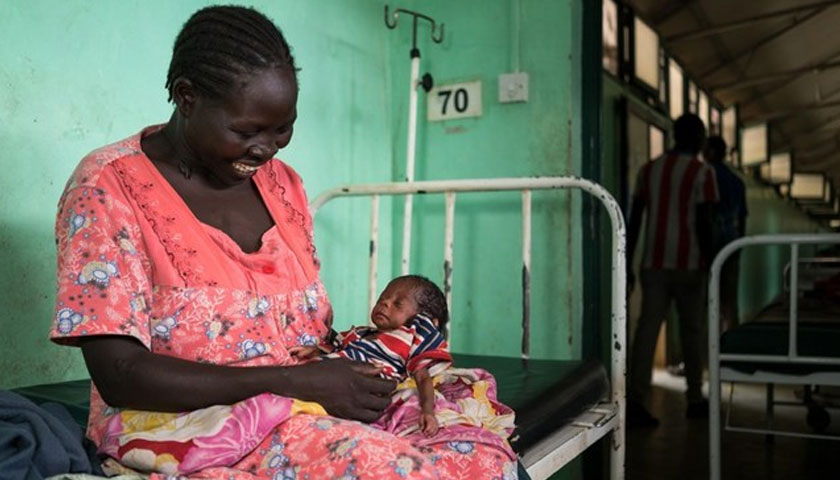Aiming to provide vital medical help for hundreds of thousands of traumatized, but courageous and resilient victims of Sudan’s “hidden” war, U.S.-based nonprofit organization African Mission Healthcare launched a new campaign to coincide with Giving Tuesday—”Nuba 2020″.
The Nuba 2020 campaign goal is to ensure the only major hospital in Sudan’s war-torn Nuba Mountains continues to save hundreds of thousands of children and adults threatened by conflict, disease and medical emergencies 365 days a year.
This is a once-in-a-generation opportunity to help the hurting and forgotten people of the Nuba Mountains before it’s too late,” said American missionary surgeon Dr. Tom Catena, who is leading the Nuba 2020 campaign and has been a medical missionary in Africa for nearly 20 years.
Catena—a native New Yorker and award-winning AMH-supported physician—is the only surgeon for 1.3 million people in the Nuba region, one of the poorest and most volatile places on earth. By contrast, the number of general surgeons needed to adequately serve the U.S. population is estimated to be at least seven per 100,000 people.
Shielded from much of the world, the little-known, yet catastrophic conflict in the Nuba Mountains—a region contested by the separate countries of Sudan and South Sudan—has claimed hundreds of thousands of lives and maimed and injured thousands more.
Situation Critical
Since 2008, Catena, a graduate of Duke University and former U.S. Navy doctor, has put his life on-the-line serving in war-zone Nuba, treating up to 350 patients a day—a staggering total of more than one million patients – including 2,200 direct war injuries, and saving the lives of tens of thousands of people.
During the war, most expat charity workers left, but “Dr. Tom,” as the locals call him, stayed. “I felt that if I left, I’d be saying my life was more important than theirs,” said 55-year-old Catena.
From 1983-2005, more than two million people died during the Sudanese civil war. After a six-year peace agreement, fighting erupted again in 2011, but now a tentative ceasefire is in place.
“The Nuba people are truly forgotten, caught in the center of the chaos and bombings, essentially stateless, and lacking any type of medical support from any government because they are stateless,” said Catena. “Without AMH’s support, thousands will suffer and die. We need to sustain the hospital and our network of clinics, buy new equipment and keep performing life-saving surgeries.”
In the shell-shocked Nuba region—roughly the size of Austria—Catena has kept the only major hospital in the region operating, even during bombing raids that targeted the hospital and his own home.
Against overwhelming odds, Catena and his team of local medical workers run the 435-bed Gidel Hospital and a network of six clinics, performing up to 2,000 operations, providing 53,632 hospital visits and caring for 80,000 patients at six community clinics annually on a total yearly budget of $1 million. By comparison in the U.S., the average number of general surgeries performed by male surgeons is approximately 500 cases a year.
“We’re the only facility in the Nuba Mountains where people can turn when their children’s lives are in jeopardy, they need surgery, or expectant mothers are having birth complications that too often can result in tragedy,” Catena said. Three out of every four women in the Nuba Mountains give birth without any medical assistance.
The Nuba 2020 campaign aims to raise $7.5 million to ensure the hospital and its network of clinics is able to continue its lifesaving work the next 20 years.
Nuba 2020: Keeping Hope Alive
“Without the hospital and clinics, hundreds of thousands of lives would be in peril,” said Catena. “But so many lives can be saved through essential medical care, and routine surgeries such as C-sections, that most Americans take for granted.”
While surgeries and hospital stays in the United States can cost tens of thousands of dollars, the same operations at Gidel Hospital cost a fraction of that. Further, according to Glassdoor, the average monthly salary for a U.S. nurse is approximately $6,000, compared to a nurse’s monthly paycheck in this region of just $265. The hospital relies entirely on charitable donations to cover costs.
“There are very few places on earth where so much can be achieved—and so many lives can be saved—with so little,” said Catena.
For more about the Nuba 2020 campaign, go to www.nuba2020.com.
